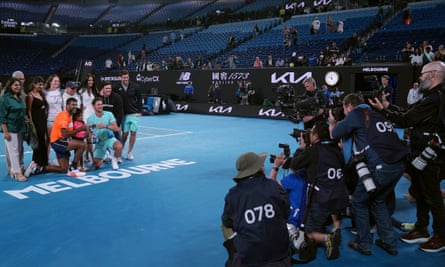Australian Open tournament director Craig Tiley says he is worried about the future of doubles in professional tennis, as the sport undergoes a process of rapid innovation in order to chase new and emerging audiences.
The ATP is undertaking a review of the doubles side of the sport, and the outcomes will inform wider reform of the professional tours and the four grand slams. One person familiar with the review, who requested anonymity, told the Guardian doubles “might not have much of a future and certainly not in its current state”.
Tiley said he is an advocate for doubles, but right now there weren’t enough ranking points, prize money or even a narrative for the players in order for doubles to “mean something”.
“I think we may have lost our way a little bit, we’re not meaning enough,” Tiley said. “We’ve got to get things right, and we can’t keep spinning our wheels on things, and make some decisions.”
The year’s first grand slam concluded on Sunday night with a riveting men’s singles final between Russian Daniil Medvedev and Jannik Sinner, won by the young Italian in five sets.
The tournament has pursued new audiences in recent years, offering fan-friendly changes including more access to-and-from seats during matches, a courtside bar and onsite entertainment to complement the tennis.
But both doubles finals struggled to attract attendances. The audience watching Australian Matt Ebden and 43-year-old Rohann Bopanna in the men’s doubles decider was a fraction of the women’s singles final that preceded it on Rod Laver Arena on Saturday night.

On Sunday afternoon, the number of people at a music concert on nearby John Cain Arena dwarfed the sparse turnout for the women’s doubles final held at the same time.
Ebden, a member of the ATP Player Advisory Council, has transitioned into being a full-time doubles player in the past three years. He said after claiming his second men’s doubles grand slam title, the ATP has “a little bit ignored” doubles.
He said he helped instigate the review to “figure out really the purpose of doubles – where it fits, why it exists, why it’s valued, if it’s not, why not”.
Rather than focus on perceived weaknesses, Ebden said doubles had unique potential.
“There is space for tennis in doubles to have fans engaged, closer to the court, maybe some music, maybe no sitting down after one end,” he said. “Just keep the game running, keep it interactive.”
after newsletter promotion
The Australian Open set an attendance record in 2024, welcoming more than one million people into the precinct over the two-week period.
Tiley said the he believed the tournament “nailed” the balance between fan and player interests, despite some pushback to the changes.
“I take an approach from a leadership point of view that I’d rather ask for forgiveness than permission, because otherwise you’re just not going to be able to move at the speed that you can move at,” he said. “The sport globally needs to look at it the same way, and do some things that really help it accelerate.”
Tiley said he wanted to do away with the “let”, where a point resets if a serve catches the top of the net but still lands in. “The extra time that it took over these two weeks of the event was over 15 hours, so it’s significant.”
He also revealed the Australian Open had not received any additional revenue this year from broadcasting or major sponsors despite starting a day earlier. Instead, the 15-day schedule would be factored into future deals, and the bonus content was given to existing partners as “goodwill”.
In a widely circulated report in the lead-up to the tournament, Tiley was described as a key figure in efforts to resist a radical restructure to the professional tour that might involved a stop in Saudi Arabia in the weeks before the Australian Open.
On Monday he said meetings on the schedule were continuing, and that the grand slams are aligned in their thinking. But he pushed back against the notion that he was some kind of ringleader. “There’s no one person that’s leading us, it’s a collective.”
